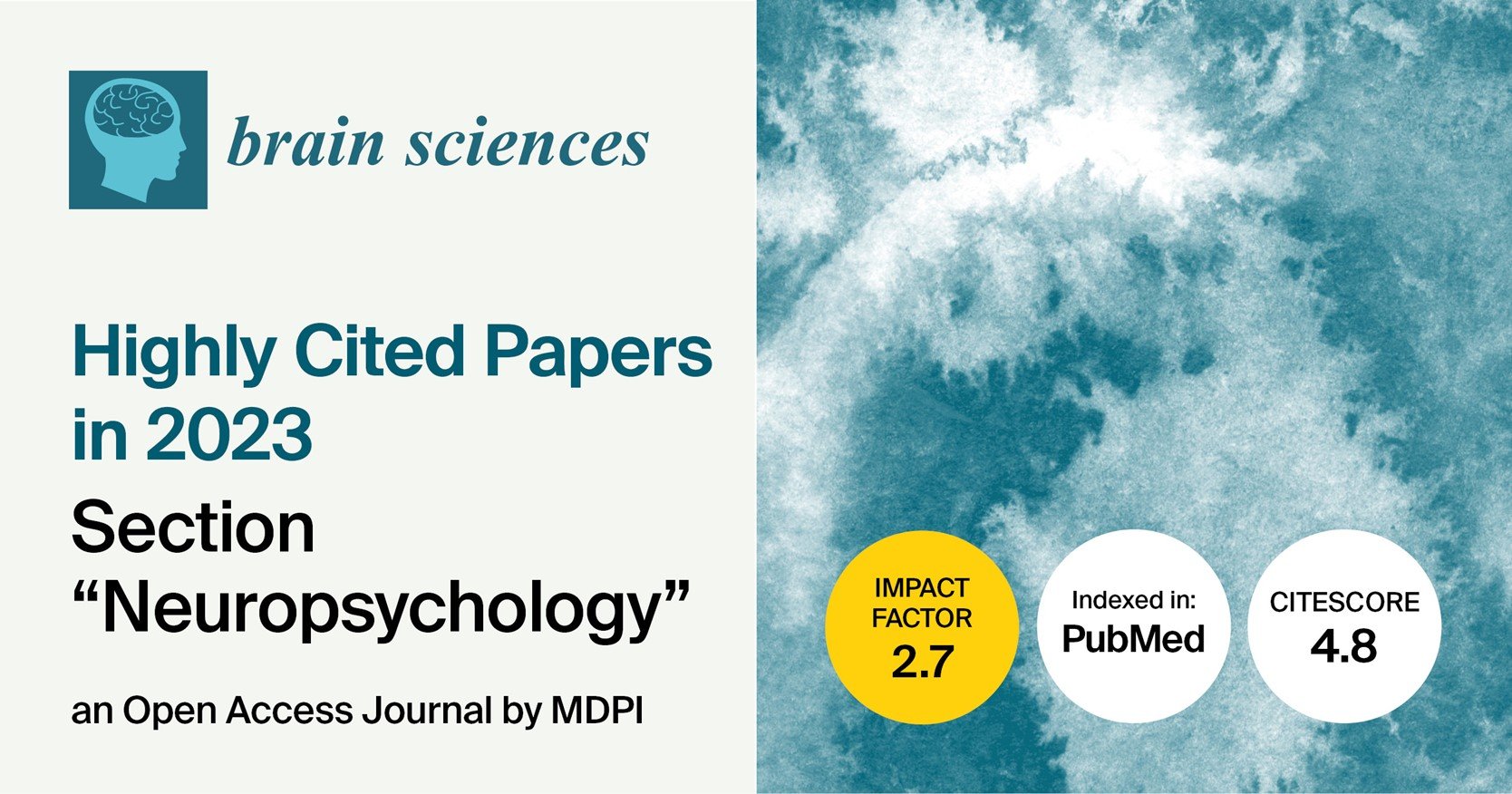
Journal Menu
► ▼ Journal Menu-
- Brain Sciences Home
- Aims & Scope
- Editorial Board
- Reviewer Board
- Topical Advisory Panel
- Instructions for Authors
- Special Issues
- Topics
- Sections & Collections
- Article Processing Charge
- Indexing & Archiving
- Editor’s Choice Articles
- Most Cited & Viewed
- Journal Statistics
- Journal History
- Journal Awards
- Society Collaborations
- Conferences
- Editorial Office
Journal Browser
► ▼ Journal BrowserNeed Help?
Announcements
17 April 2025
Brain Sciences | Highly Cited Papers in 2023 in the Section “Neuropsychology”

The “Neuropsychology” Section of Brain Sciences (ISSN: 2076-3425) aims to bring together research on the relationship between the brain and human cognitive, emotional, and behavioral functions. Neuropsychological testing typically evaluates individual functioning in a number of areas, including sensorimotor functions, perception, attention, spatial construction, intelligence, executive functions, memory, language, motivation, emotion, and quality of life. Articles focusing on neuropsychological functions in both healthy and disordered states and across the lifespan are encouraged. Topic areas include both developmental (e.g., ADHD, dyslexia, and other learning disabilities) and adult studies (e.g., cognitive and affective consequences of stroke and traumatic brain injury, as well as progressive conditions, such as Alzheimer’s and Huntington’s disease). Contributions dealing with the development and testing of neuropsychological interventions are also encouraged. Original empirical research based on both clinical and experimental neuropsychological paradigms, as well as systematic reviews, meta-analyses, and theoretical articles, is envisaged. Case studies illustrating important questions about brain–behavior relationships will also be considered.
As all of the articles published in our journal are of an open access format, you have free and unlimited access to the full texts. We welcome you to read our most highly cited papers published in 2023, listed below.
1. “The Association between COVID-19 Related Anxiety, Stress, Depression, Temporomandibular Disorders, and Headaches from Childhood to Adulthood: A Systematic Review”
by Giuseppe Minervini, Rocco Franco, Maria Maddalena Marrapodi, Vini Mehta, Luca Fiorillo, Almir Badnjevi´c, Gabriele Cervino and Marco Cicciù
Brain Sci. 2023, 13(3), 481; https://doi.org/10.3390/brainsci13030481
Available online: https://www.mdpi.com/2076-3425/13/3/481
2. “GLP-1 Receptor Agonists and Related Mental Health Issues; Insights from a Range of Social Media Platforms Using a Mixed-Methods Approach”
by Davide Arillotta, Giuseppe Floresta, Amira Guirguis, John Martin Corkery, Valeria Catalani, Giovanni Martinotti, Stefano L. Sensi and Fabrizio Schifano
Brain Sci. 2023, 13(11), 1503; https://doi.org/10.3390/brainsci13111503
Available online: https://www.mdpi.com/2076-3425/13/11/1503
3. “Toxicity of Synthetic Cannabinoids in K2/Spice: A Systematic Review”
by Mariana Campello de Oliveira, Mariana Capelo Vides, Dângela Layne Silva Lassi, Julio Torales, Antonio Ventriglio, Henrique Silva Bombana, Vilma Leyton, Cintia de Azevedo-Marques Périco, André Brooking Negrão, André Malbergier et al.
Brain Sci. 2023, 13(7), 990; https://doi.org/10.3390/brainsci13070990
Available online: https://www.mdpi.com/2076-3425/13/7/990
4. “Brain Correlates of Eating Disorders in Response to Food Visual Stimuli: A Systematic Narrative Review of FMRI Studies”
by Alessia Celeghin, Sara Palermo, Rebecca Giampaolo, Giulia Di Fini, Gabriella Gandinoand and Cristina Civilotti
Brain Sci. 2023, 13(3), 465; https://doi.org/10.3390/brainsci13030465
Available online: https://www.mdpi.com/2076-3425/13/3/465
5. “Enhanced Skills Training in Affective and Interpersonal Regulation (ESTAIR): A New Modular Treatment for ICD-11 Complex Posttraumatic Stress Disorder (CPTSD)”
by Thanos Karatzias, Edel Mc Glanaghy and Marylene Cloitre
Brain Sci. 2023, 13(9), 1300; https://doi.org/10.3390/brainsci13091300
Available online: https://www.mdpi.com/2076-3425/13/9/1300
6. “Neurocognitive Deficits in First-Episode and Chronic Psychotic Disorders: A Systematic Review from 2009 to 2022”
by Nadja Tschentscher, Christian F. J. Woll, Julia C. Tafelmaier, Dominik Kriesche, Julia C. Bucher, Rolf R. Engel and Susanne Karch
Brain Sci. 2023, 13(2), 299; https://doi.org/10.3390/brainsci13020299
Available online: https://www.mdpi.com/2076-3425/13/2/299




